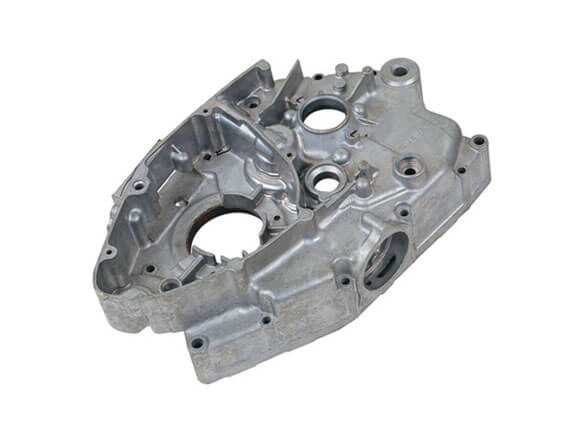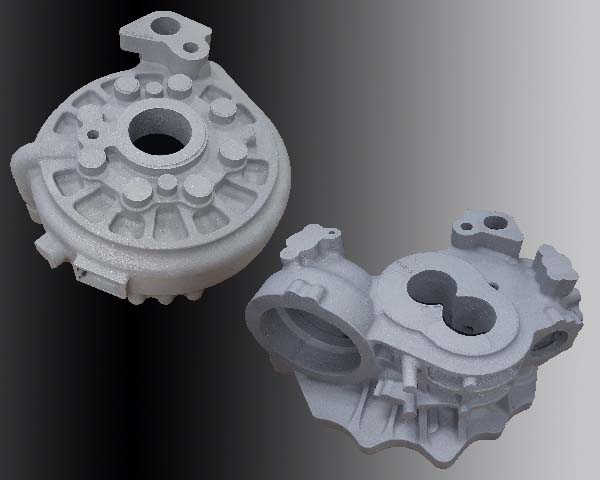Checking Out the Ingenious Processes Behind Modern Aluminum Shop Operations
Modern aluminum shop procedures are undergoing substantial change. Automation and AI are improving manufacturing approaches, enhancing both performance and precision. The integration of 3D printing is streamlining mold production, while sustainability techniques are coming to be a lot more essential. Each of these advancements plays a crucial function in redefining the market. The implications of these adjustments prolong beyond plain production effectiveness. What possibilities and obstacles exist ahead for aluminum factories in this evolving landscape?
The Duty of Automation in Light Weight Aluminum Foundries

Furthermore, automation adds to enhanced safety requirements within the foundry setting. By moving dangerous tasks to equipments, human employees can focus on supervisory roles and quality control, reducing the threat of accidents. On top of that, information analytics originated from automated procedures offer important insights right into functional performance, resulting in far better decision-making and continuous enhancement. As the need for light weight aluminum products grows, the adoption of automation technologies will likely increase, even more changing the landscape of aluminum factory procedures.
Advancements in Spreading Technologies
Recent advancements in casting modern technologies are changing light weight aluminum shop operations. Technologies such as 3D printing assimilation, advanced alloy formulas, and automated procedure optimization are enhancing efficiency and item quality. These developments are pivotal in fulfilling the developing needs of the industry.
3D Printing Assimilation
Incorporating 3D printing technology right into aluminum factory operations has changed standard spreading methods, improving both efficiency and accuracy. This innovative method enables for the quick manufacturing of intricate mold and mildews and cores, significantly reducing lead times and product waste. By making use of additive manufacturing, shops can develop detailed geometries that were previously difficult or difficult to accomplish with traditional methods. The versatility of 3D printing also makes it possible for fast style alterations, promoting a much more dexterous production procedure. On top of that, this assimilation supports the use of light-weight frameworks, which is progressively crucial in markets such as vehicle and aerospace. As light weight aluminum shops proceed to embrace 3D printing, they position themselves at the forefront of technical development, driving improvements in item top quality and functional abilities.
Advanced Alloy Formulations
The advancement of sophisticated alloy formulas has actually considerably improved spreading modern technologies in aluminum shop procedures. These formulations integrate various elements, such as silicon, copper, and magnesium, to improve mechanical residential or commercial properties and thermal resistance. By customizing the structure of aluminum alloys, makers can accomplish specific efficiency qualities that satisfy the needs of diverse applications, from auto parts to aerospace frameworks. Using advanced alloys also adds to reduced weight and increased strength, which are critical variables in contemporary design. In addition, advancements in alloy development allow much better fluidity during casting, leading to improved surface area finishes and lowered problems. Overall, advanced alloy solutions stand for a substantial leap ahead, positioning light weight aluminum shops to fulfill the progressing requirements of different industries properly.
Automated Process Optimization
Improvements in casting technologies have led the way for automated process improvement in aluminum shop operations. By integrating advanced software program and real-time information analytics, factories can currently simplify production procedures and improve high quality control. Automated systems check variables such as temperature, cooling, and stress prices, permitting instant adjustments that minimize issues and waste. In addition, artificial intelligence algorithms evaluate historic efficiency information to forecast excellent settings, consequently raising efficiency and minimizing cycle times. Robotics likewise play a significant duty, taking care of recurring jobs that improve security and precision. In general, these developments not only drive functional effectiveness but also enable factories to fulfill the expanding need for high-grade aluminum components in numerous sectors.
Smart Manufacturing and Market 4.0 Assimilation
The integration of Smart Production and Industry 4.0 within light weight aluminum factories is transforming functional efficiency. By leveraging IoT technologies, automation, and robotics, factories can maximize production processes and reduce downtime. In addition, information analytics supplies crucial understandings that improve decision-making and drive constant enhancement.
IoT in Factory Procedures
As manufacturers significantly accept the Internet of Points (IoT), factory operations are experiencing a transformative change towards clever manufacturing and Industry 4.0 combination. Aluminum Foundry. IoT technologies allow real-time information collection and analysis, boosting decision-making processes and operational performance. Sensors and linked gadgets check devices efficiency, material usage, and ecological conditions, enabling aggressive maintenance and source optimization. This connection cultivates a much more dexterous production environment, where adjustments can be made promptly in reaction to market needs. Additionally, IoT facilitates enhanced traceability and quality assurance, as data from the entire production cycle can be conveniently accessed and evaluated. On the whole, the integration of IoT in shop procedures substantially boosts productivity and drives development in light weight aluminum production procedures
Automation and Robotics Assimilation
Automation and robotics integration is reinventing light weight aluminum foundry operations by enhancing performance and accuracy. This transformative approach improves procedures such as molding, pouring, and finishing, reducing human mistake and enhancing outcome uniformity. By employing innovative robotic systems, shops can achieve greater manufacturing rates while keeping rigorous quality standards. Automated systems also allow real-time tracking and adaptive control, permitting swift modifications to production parameters. Furthermore, the integration of robotics minimizes labor expenses and mitigates safety risks related to hand-operated handling of molten metal. As shops accept smart production concepts intrinsic in Sector 4.0, the synergy between automation and robotics solidifies their competitive side, paving the means for sustainable development and development in the light weight aluminum spreading sector.
Data Analytics for Efficiency
Utilizing information analytics substantially improves efficiency within aluminum shop procedures, lining up with wise production and Sector 4.0 principles. By leveraging real-time information collection and analysis, factories can keep an eye on production processes, forecast tools failures, and maximize resource appropriation. This data-driven technique helps with informative decision-making, allowing supervisors to determine traffic jams and boost operations. Additionally, anticipating analytics empowers factories to prepare for market demands, consequently decreasing waste and guaranteeing prompt product shipment. Combination of information analytics with IoT tools enhances operational visibility, promoting an aggressive maintenance society. Inevitably, applying these sophisticated logical strategies not only improves performance however additionally drives advancement, positioning aluminum factories to satisfy the developing needs of the sector while keeping one-upmanships in a rapidly altering landscape.
Sustainable Practices in Aluminum Spreading
While the aluminum casting sector has actually typically dealt with environmental difficulties, numerous foundries are currently taking on sustainable techniques to reduce their effect (Aluminum Casting Company). A considerable focus has gotten on recycling light weight aluminum scrap, which not only decreases waste however additionally conserves energy compared to primary aluminum production. Innovative melting modern technologies, such as induction heaters, boost power effectiveness and reduced greenhouse gas emissions
Additionally, shops are applying closed-loop water systems to reduce water consumption and reduce thermal contamination. The use of environmentally friendly binders in mold-making processes is acquiring grip, further lowering harmful exhausts.
Some facilities are investing in eco-friendly energy sources to power procedures, lining up with worldwide sustainability objectives. By incorporating these methods, the aluminum casting sector is evolving towards a much more eco liable future, demonstrating that economic development can exist together with ecological stewardship - Aluminum Foundry. These efforts mirror a commitment to sustainability and the relevance of environmental liability in production
Quality Assurance Innovations
As the aluminum spreading market advancements in the direction of sustainability, the importance of quality assurance advancements ends up being significantly obvious. Modern aluminum foundries are adopting innovative modern great post to read technologies to boost their top quality guarantee processes. Methods such as real-time surveillance and data analytics allow makers to identify disparities and flaws early in the manufacturing cycle. Executing automated assessment systems outfitted with maker discovering algorithms assurances that items meet strict high quality criteria while minimizing human error.
Furthermore, the combination of non-destructive screening approaches, such as ultrasonic and radiographic examinations, gives much deeper insights into the integrity of spreadings without damaging the material. These innovations not just enhance product reliability but also reduce waste, straightening with sustainability goals. Furthermore, the fostering of standard high quality frameworks helps streamline operations throughout various foundries, ensuring consistency in output. Collectively, these improvements are reshaping quality assurance, promoting a culture of quality within the light weight aluminum spreading market.
Future Trends in Aluminum Foundry Procedures
What advancements exist ahead for aluminum shop procedures? The future of light weight aluminum foundries is poised for change via advancements in automation, man-made knowledge, and lasting practices. The assimilation of robotics and automated systems is anticipated to enhance performance and precision in the casting procedures, lowering human error and labor prices. Additionally, AI-driven analytics will allow real-time surveillance and predictive upkeep, optimizing operational efficiency and minimizing downtime.
Sustainability continues to be a focal factor, with foundries significantly embracing green methods, such as utilizing recycled aluminum and creating low-emission melting innovations. Technologies in 3D printing are additionally anticipated to reinvent mold-making, permitting for complex geometries and decreased material waste. As the sector welcomes digitalization, data-driven decision-making will come to be crucial, enabling foundries to respond promptly to market needs. Jointly, these fads promise to a knockout post redefine aluminum foundry procedures, making them extra reliable, lasting, and adaptable to future challenges.

Frequently Asked Concerns
What Safety Measures Are Implemented in Light Weight Aluminum Shop Workflow?
Aluminum factory procedures implement different safety procedures, including personal safety equipment, air flow systems to handle fumes, regular safety training, emergency situation action plans, and rigid surveillance of temperature and tools to stop mishaps and guarantee worker security.
Just How Do Foundries Take Care Of Labor Force Training for New Technologies?

What Products Are Typically Recycled in Light Weight Aluminum Foundries?
Light weight aluminum factories typically reuse scrap aluminum, consisting of post-consumer products like drink containers, vehicle components, and construction products. This reusing procedure reduces waste and preserves resources, adding to a more sustainable aluminum production market.
Exactly How Does Light Weight Aluminum Casting Influence the Setting?
Aluminum casting effects the atmosphere through energy-intensive procedures, greenhouse gas discharges, and possible regional contamination. Nevertheless, advancements in recycling and lasting practices can reduce these effects, promoting an extra eco-friendly technique to aluminum production.
What Are the Common Lead Times for Aluminum Spreading Projects?
Regular lead times for light weight aluminum casting projects differ considerably, generally varying from two to six weeks. Factors influencing these timelines include intricacy, order dimension, and material schedule, affecting total production routines in foundry operations.
Automation progressively plays a vital duty in aluminum shops, improving efficiency and accuracy in the production process. Developments in casting innovations have paved the way for automatic process improvement in light weight aluminum factory procedures. Using data analytics significantly improves efficiency within aluminum factory procedures, straightening my review here with wise production and Sector 4.0 principles. A considerable emphasis has actually been on reusing aluminum scrap, which not only lowers waste but also saves energy contrasted to key aluminum production. Aluminum foundries commonly reuse scrap light weight aluminum, including post-consumer items like beverage cans, vehicle components, and building materials.